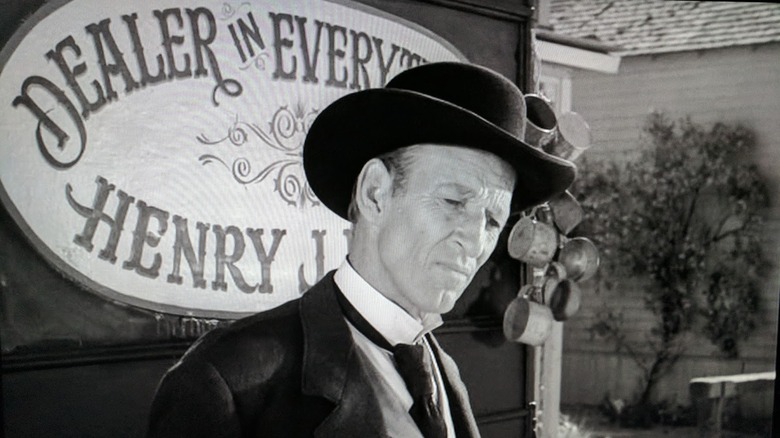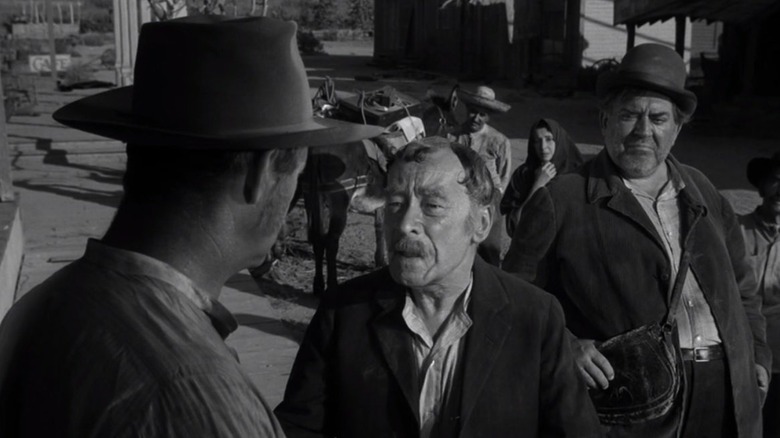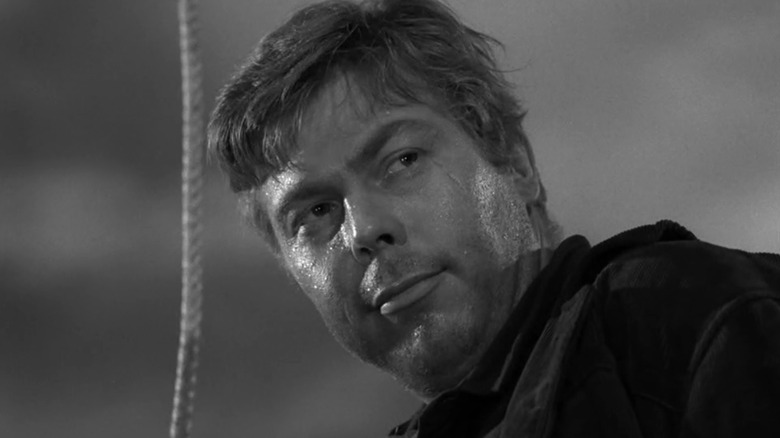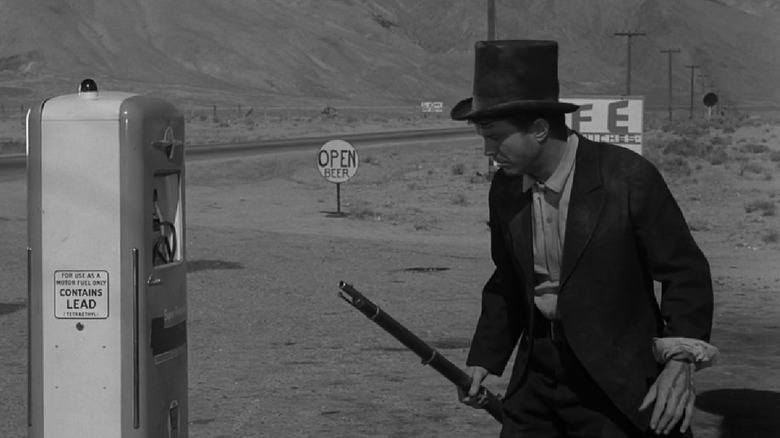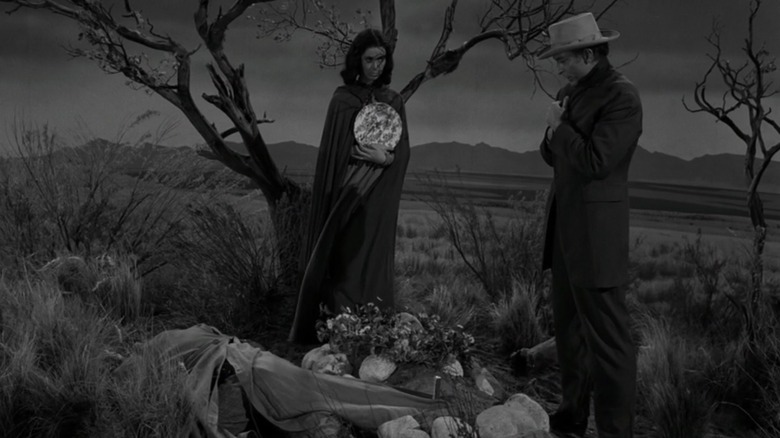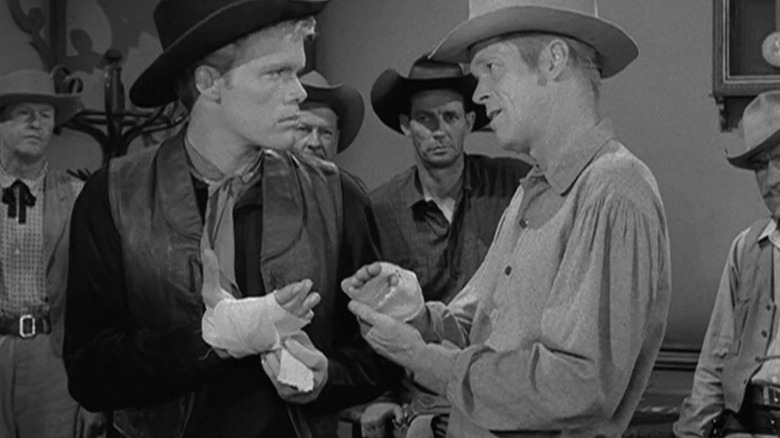The 5 Best Western Episodes Of The Twilight Zone
For a science fiction series, "The Twilight Zone" had an incredibly broad range of genres that it pulled from. War stories, space adventures, horror tales, post-apocalyptic sagas, and tons of other settings popped up in all five seasons of Rod Serling's acclaimed anthology masterpiece. The series also featured several prominent Western-themed episodes, each with a distinct "Twilight Zone" twist.
Serling seemed to have a soft spot for the cowboy genre. After "The Twilight Zone" came to an end in 1964, he quickly followed it up with a full-blown Western series called "The Loner," which premiered on CBS the next year. "The Loner" was short-lived, but it made clear the affinity Serling had for Westerns, and "The Twilight Zone" has plenty of stories to choose from set in the old American West.
While everyone has their favorite "Twilight Zone" episodes, these particular Western episodes have stood the test of time and remain great watches more than 60 years later.
Dust (Season 2, Episode 12)
First on our list is an episode from the middle of "The Twilight Zone" season 2, which follows a young condemned to die by hanging and his father, who's intent on saving his life. While driving drunk on his wagon through the tiny Western town where he lives, the young man (John Alonzo) strikes and kills a young girl. A traveling salesman (Thomas Gomez) supplies the town with rope for the hanging, then tries to make an extra buck by passing ordinary dirt off as "magic dust" to the young man's father (Vladimir Sokoloff).
The salesman promises that by sprinkling the dust around the assembled crowd at the hanging, the father can soften the hearts of his neighbors and urge them to change their minds about killing his son. As you'd expect from "The Twilight Zone," things don't exactly go that way, but a surprising end to the event leaves everyone involved baffled and deeply affected.
Written by Serling himself, this is the classic breed of "Twilight Zone" episode where the ending brings less of a moral than it does a powerful sense of surreal wonder. The lasting effect is more emotional impact than the concrete message, which is often when the show is at its strongest. And "Dust" is full of the sort of mid-century stage character archetypes that work so well in Serling's teleplays.
Execution (Season 1, Episode 26)
Not one, but two of the episodes on this list revolve around hangings in Old West towns, and it only makes sense to discuss them one after the other. "Execution" aired in the show's first season, a bit before "Dust," and its subjects aren't quite as sympathetic as the characters in that later story. The subject of the hanging is Joe Caswell (Albert Salmi), a crook and killer whom Serling describes in his opening narration as someone who, "when the good Lord passed out a conscience, a heart, a feeling for fellow men, must have been out for a beer and missed out."
Caswell is saved from his execution by the sudden intervention of a scientist from the future named Manion (Russell Johnson), who uses a time machine to yank the murderer into his own time. Manion becomes fearful when he realizes the sort of person he's taken out of time, but though Caswell initially resists being sent back to die, he's driven near to madness by the mania of contemporary life and technology. In the end, both he and a fellow villain from Manion's own time receive punishment, but not quite in the way you might expect.
This is "Twilight Zone" irony at its most overt, and the episode has some interesting meditations on innocence and civilization. Plus, what's more Rod Serling than a time travel story in the Old West? While we're on the subject ...
A Hundred Yards Over the Rim (Season 2, Episode 23)
Did somebody say Old West time travel story? Another season 2 "Twilight Zone" episode, "A Hundred Yards Over the Rim," takes the same genre mashup as "Execution" but puts a very different spin on it. The episode follows Christian Horn (1968 Academy Award winner Cliff Robertson), a member of a wagon train who leaves his party behind to search for water and supplies. With his young son extremely sick, life and death hang in the balance.
But what Horn finds over the rim isn't more natural landscape. Instead, he finds himself transported to 1960s New Mexico. Locals at a diner help him but believe him to be mentally unwell. Fortunately, they also present an opportunity for Horn to potentially save his son with some medical advancements from the future.
Another Rod Serling original, this is a great example of the classic "Twilight Zone" tale of a person out of time. The show draws some of its most memorable moments from simply setting two vastly different eras against each other and letting the camera roll. And the Oscar-winning pedigree of the cast on this particular episode certainly helps add to the overall effect.
The Grave (Season 3, Episode 7)
Perhaps the most star-studded "Twilight Zone" episode on this list, and certainly the spookiest, "The Grave" features the talents of era stars like Lee Marvin, Lee Van Cleef, and James Best. That alone makes it worth a mention, but the story itself is also quite compelling and more than a little haunted.
Gun for hire Conny Miller (Marvin) is contracted to kill the villainous Pinto Sykes (Dick Geary), but before he has his chance at the man, Sykes is struck dead by a group of fed-up townsfolk. Before his death, Sykes declared that Miller had been avoiding him on purpose and that he was a coward. To prove otherwise, Miller visits the dead man's grave on a dare, and he gets more than he bargains for while there.
Written and directed by Montgomery Pittman, "The Grave" leans more into the true supernatural than "The Twilight Zone" typically did during its original run, as it was primarily a science fiction series. However, the climax of this particular season 3 episode embraces the ghost story genre with some memorable imagery and a particularly ghastly closing narration from Serling: "Take this with a grain of salt or a shovelful of earth, as shadow or substance, we leave it up to you."
Mr. Denton on Doomsday (Season 1, Episode 3)
We'll close this list with one of the very first "Twilight Zone" episodes. "Mr. Denton on Doomsday" bears many of the markers that would become commonly associated with the show — mysterious peddlers of strange items, glimpses into alternative lives, and endings that mix melancholy with catharsis.
The story follows the titular Al Denton (Dan Duryea), a former gunfighter of immense fame who turned to drinking out of guilt for the many men he killed in duels. When the intervention of the enigmatic Henry J. Fate brings Denton back to something resembling his former self, it's only a matter of time before another young gun looking for fame comes with a challenge in hand. But while Fate's meddling may lead to a tense showdown, the episode has a much more satisfying conclusion than the grim art of dueling may suggest.
Written by Rod Serling and featuring a guest turn from Martin Landau, "Mr. Denton on Doomsday" gave a perfect idea back at its premiere of the kind of show viewers could expect in "The Twilight Zone." And it may just be that the series' first Western episode is still its best.
